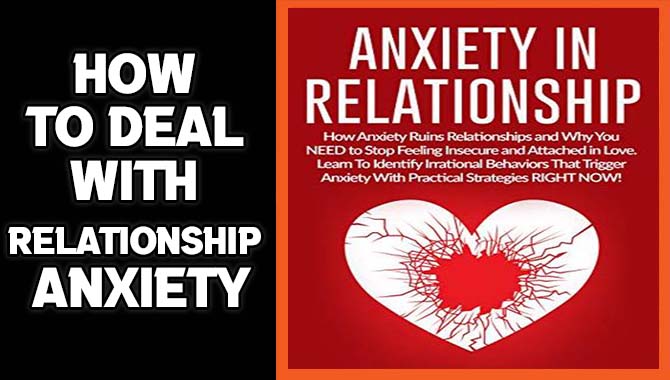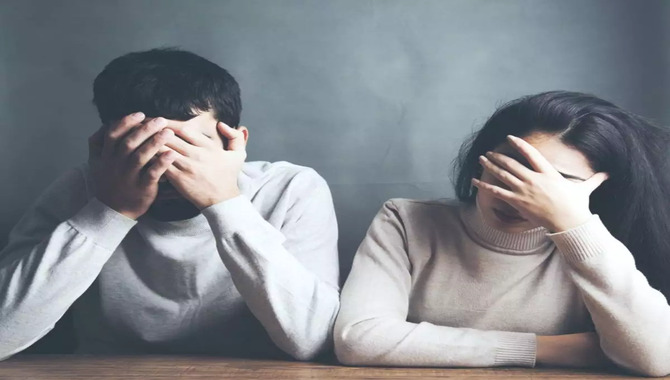So you’re in a relationship, and everything seems to be going great – until suddenly, anxiety kicks in. Relationship anxiety is the common feeling of anxiety in relationships – whether the anxiety is related to positive or negative aspects of your relationship.
But no matter how anxious you feel, remember that there are ways to deal with it. This blog post will outline how to deal with relationship anxiety. From self-care strategies to communication tips, read on to find out all you need to get started in managing your anxiety in relationships.

What Is Relationship Anxiety?

Relationship anxiety is a feeling of fear or worries about relationships. It can be mild or severe and take many different forms.
People with relationship anxiety may experience discomfort in specific social or romantic situations. They may feel like they’re not good enough or don’t know how to act. They may feel like they’re always performing poorly and may worry about making the wrong decisions.
Relationship anxiety can interfere with a person’s ability to have healthy relationships. It can make it difficult for them to establish and maintain trust, leading to conflicts and problems in the relationship.
It can also make it difficult for them to communicate effectively with their partner. In extreme cases, relationship anxiety can lead to suicide attempts or other self-destructive behaviors.
Causes Of Relationship Anxiety

Many factors can contribute to relationship anxiety, but the most common ones are:
- Fear of intimacy
- Fear of being criticized or rejected
- Fear of losing the relationship
- Fear of abandonment
- Fear of not being good enough for the other person
- Difficulty expressing emotions
- Low self-esteem
10 Ways To Deal With Relationship Anxiety

Most of us deal with anxiety in one way or another. Whether it’s in our personal lives or our professional careers, anxiety can be a real pain in the ass.
But it doesn’t have to be. By following these 10 tips, you can start to deal with relationship anxiety healthily. Yoga and meditation are great ways to reduce anxiety in the relationship setting.
Discuss your fears and worries with your partner and be open to their opinions. Set realistic goals together and work towards them. Communication is key in any relationship, and honesty is key in anxiety disorder. So, give these tips a try and see how they can help you in your healthily dealing with anxiety.
1. Identify The Source Of Your Anxiety

It can be tough to deal with anxiety, but there are a few things that you can do to help.
The first step is to identify the source of your anxiety. This means figuring out what’s causing it and then addressing it head-on.
For example, if a fear of public speaking causes your anxiety, you may want to try practicing speaking in front of a group. If your anxiety is related to a specific situation or person, then you may need to work on coping mechanisms for that situation or person.
2. Understand How Your Anxiety Affects Your Relationship

When it comes to relationships, anxiety can be a major challenge. However, with the help of your partner, you can overcome this obstacle and build a stronger relationship. Talking about your anxiety is an important step in repairing any damage it might have caused.
It will also provide opportunities to learn more about each other’s thoughts and feelings. Anxiety levels will usually decrease significantly if relaxation techniques are regularly practiced before big dates or conversations, making relationship-building much easier.
3. Take Action To Reduce Or Manage Your Anxiety

There is no single answer when it comes to managing anxiety. However, recognizing the warning signs and taking action to reduce or manage them can improve your mental health. Practicing self-awareness will also help you identify your triggers and better decide how to deal with anxiety.
In addition, working together with your partner can be extremely effective in reducing anxiety levels. It takes time for relationships – even romantic ones – to grow and evolve; patience is key to overcoming anxious thoughts and behaviors.
4. Practice Relaxation Techniques
There are a few things that you can do to help ease your anxiety in relationships. One of the most important things is to practice relaxation techniques regularly. This will help reduce the amount of stress you feel and allow you to have better conversations and interactions with others.
Another thing that you can do is focus on the positive aspects of your relationships. This will help to offset any negative feelings that may be coming up, and it will also make them feel more enjoyable. Taking time for yourself every day will also help you to relax and recharge, which will, in turn, make your relationships easier.
5. Get Support From Family And Friends
If you’re struggling with relationship anxiety, getting support from family and friends is important. They’ll provide you with unbiased advice and understanding, which will help you feel better and cope better with your anxiety.
It’s also important to remember that everyone experiences relationship anxiety differently, so don’t feel you have to share everything with them. Let them know how you’re feeling, but be mindful not to burden them unnecessarily. In return, they should be willing to listen attentively and offer any support they can.
6. Make A List Of Your Anxiety Triggers
Many things can trigger your anxiety, so it’s important to take a closer look at what sets it off. Once you’ve identified your anxiety triggers, you’ll need to find ways to avoid them. Here are a few tips:
- Make a list of all the things that make you anxious. This will help you focus on the specific things causing your anxiety.
- Stick to a routine as much as possible. This will help reduce the chances of unexpected events triggering your anxiety.
- Take some time for yourself each day. This allows you to relax and destress, which will help reduce the severity of your anxiety symptoms.
7. Identify What Emotions You Feel When Anxious
When you’re anxious, you may feel various emotions, including fear, worry, and anxiety. It can be hard to identify which emotion is predominant at any given time, but it’s important to try and figure it out.
Once you’ve identified your main emotion, you can start to work on managing it. This means you need to understand why you’re feeling the way you are and what triggers those emotions. Once you know this, you can start to develop strategies for dealing with them.
One of the best ways to deal with relationship anxiety is by talking about it with someone who understands your situation. Talking about your anxieties will not only help ease them temporarily, but it will also help in the long run by promoting understanding and mutual support between you and your partner.
8. Recognize Why Certain Situations Make You Anxious
There are a few reasons why certain situations can make you anxious.
One reason is that you may feel like you’re not in control of the situation. This can be especially true if you’ve had a history of anxiety or panic attacks in similar situations. Another reason is that you may feel like you’re not good enough or that people will judge you. In particular, it’s common to feel this way regarding relationships and social interactions.
9. Talk Openly About Your Feelings With Your Partner

Talking openly and honestly about our feelings is important in solving relationship issues. However, it can be challenging to do so.
That’s why it’s important to make time for each other – no matter how busy we are. Sometimes the best way to deal with a problem is by talking out loud to someone we trust.
Talking isn’t just healthy for us emotionally; it can also help relieve anxiety and stress. When things get tough, though, sometimes we might feel like giving up or staying in denial mode instead of facing the issue head-on again with our partner. In this case, professional therapy could be a good option as certain problems might need more than just talk and understanding to be resolved effectively.
10. Get Professional Help If Necessary

If you are still struggling with relationship anxiety, it is best to seek professional help. There are a variety of treatments available that can help you deal with anxiety healthily.
CBT is one such approach that has been proven effective in tackling relationship-related anxiety. It’s important to be honest, and open with your therapist – letting them know about all your concerns and struggles.
This will enable them to develop an effective treatment plan tailored specifically for you. It is also very helpful to keep a journal in which you record your thoughts and progress regularly. Doing this allows you to track any changes in behavior or mood over time and make informed decisions accordingly.
Conclusion
Relationship anxiety can be debilitating and significantly impact your quality of life. If you’re struggling to cope with anxiety in your relationship, don’t worry – we’ve got you covered with our tips for how to deal with relationship anxiety.
Starting by understanding what relationship anxiety is and the different causes will help you to better identify and deal with the anxiety in your relationship.
Thank you for reading, and we hope that this blog helped you get started on dealing with relationship anxiety.
Frequently Asked Questions
1. What Are Some Of The Most Common Symptoms Of Relationship Anxiety?
Ans: Some of the most common symptoms of relationship anxiety are feeling like your stomach is in knots, experiencing a sense of dread and doom before any major event or conversation, excessive worrying, ruminating on past failures, experiencing physical sensations like heart palpitations or migraines, and avoiding social gatherings and interactions.
2. How Can I Deal With My Anxiety Healthily?
Ans: You can do a few things to deal with your anxiety healthily.
- Awareness of the triggers that lead to anxiety is the first step.
- Secondly, you need to practice self-compassion. This means being kind to yourself even when you’re experiencing negative emotions.
- Finally, it’s important to stay active and healthy both mentally and physically. This means exercising regularly, eating a balanced diet, and spending time outdoors.
3. How Can I Get Over An Obstacle In My Relationship?
Ans: It can be tough to overcome an obstacle in your relationship, but by following these simple steps, you’ll be on your way to a brighter future.
- Start by acknowledging that feeling anxious and stressed in a new relationship is normal.
- Make time for yourself – set aside time each week to relax, read, or do something you enjoy.
- Talk openly with your partner about what’s going on in your head and heart – this will help them understand you better and help them to support you in whatever direction you choose.
- Believe that things will get better – often, when we’re faced with an obstacle, our mind creates negative thoughts which can block progress.
4. What Steps Can I Take To Improve My Communication Skills With My Partner?
Ans: One of the ways that you can improve your communication skills with your partner is by making a list of the things that anxiety tends to cause in people. Next, discuss these issues in advance, so you are on the same page. Additionally, let your partner know that you’re feeling anxious without putting any pressure on yourself. Listen attentively and validate their feelings and thoughts even if you don’t agree with them.
5. Do Any Particular Activities Or Therapies Help Relationship Anxiety Sufferers Feel Better Overall?
Ans: Relationship anxiety sufferers can feel better overall by trying different activities and therapies. Here are some of the most popular ones: – Yoga: Many relationship anxiety sufferers find yoga incredibly helpful in reducing tension and improving moods. It also aids in relieving anxiety in the neck, shoulders, and spine. – Meditation: Meditation has been found to reduce anxiety, stress, and negative thoughts in general.

Leave a Reply